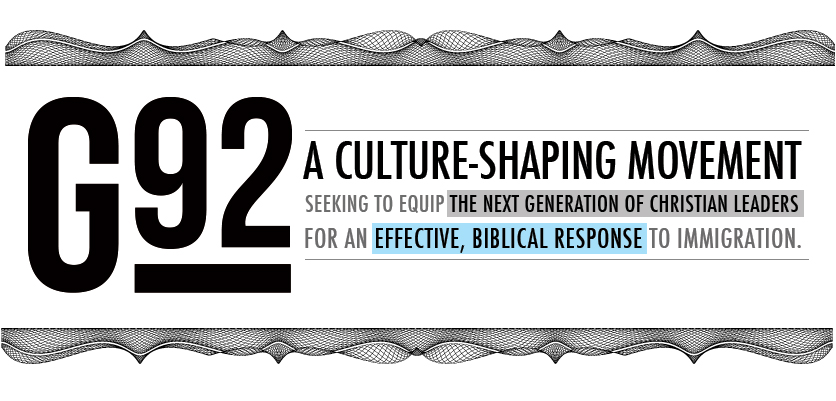It may not seem like it, but there is a movement happening in the United States right now: a movement lobbying for immigration reform.
On Oct. 24, G92, an immigration organization, held an event in the Calvin College recital hall called “Become the Stranger.” This event focused on the current immigration system in the U.S., pointing out many of the flaws in the system.
Daniel Watts, G92 college campus coordinator, and Jenny Yang, former January Series speaker, came to speak at the event. Kate Kooyman, the representative for the Evangelical Immigration Table working within the Christian Reformed Church (CRC) offices, also coordinated the event.
G92 was a movement started by the Evangelical Immigration Table that focuses on holding events and creating a movement on college campuses. The Evangelical Immigration Table is an organization of faith leaders and churches across America focused on advocating for immigration reform. The CRC is also a part of the Evangelical Immigration Table.
The CRC has been lobbying for immigration reform since 2007, when a study committee was first formed by Synod to study the immigration system in the U.S.
Calvin College is not often directly affected by the mandates of Synod, but last Thursday, an immigration reform event came to Calvin, partly sponsored by the CRC Office of Social Justice.
According to Kooyman, Calvin was targeted as an ideal place for a G92 event because of its location and connection to the CRC.
“I think Calvin was an ideal place for a G92 event because Calvin is in an important congressional district for immigration reform advocacy,” Kooyman said. “Calvin is also a well-respected Christian college with smart students who will become important people, and we want these students to know how important immigration reform is.”
Around 25 students came to the event at Calvin last Thursday. The Social Justice Coalition, a Calvin student organization, helped organize the event. The number of students who attended did not discourage Kooyman.
“When organizing the event, we never put a number on how many students should be there,” Kooyman said. “We were happy with the crowd there was. We obviously would have been happy if the event was even fuller, but we still consider the event a success.”
Watts was also not discouraged by the number of students who attended.
“We know students have a lot going on,” Watts said. “It’s hard to expect many students to attend when it’s a Thursday night and everyone is busy.”
The event began with Kooyman handing out “I.D. cards,” which were different for each person, and shared true stories of immigrants. Kooyman then asked each attendee to try to find a way to immigrate to the U.S., going through the current four different immigration channels.
Later, Jenny Yang spoke about the message of the Bible directly relating to “welcoming the stranger,” and therefore implying a need for immigration reform. Watts spoke after Yang, stating the importance of college students being involved in advocating for immigration reform.
Gracie Aylmer, a senior at Calvin, attended the event because she is interested in social justice issues. Aylmer believes the current immigration system is unjust.
“We can’t identify ourselves as Christians if we’re not willing to respond to God’s call for justice,” Aylmer said. “We are asked to love the stranger — to include and embrace the stranger; without immigration reform that’s not going to happen.”
Beth Henkels, another senior at Calvin, was less informed about immigration before attending the event. She said she learned more about the difficulties for immigrants at the event.
“I knew immigrating to the U.S. was difficult,” Henkels said, “but learned that doing so can be nearly impossible for most people. I think a lot of people, myself included, have been misinformed or ignorant about the severity of this issue, and this event helped me see that it is our duty as followers of Christ to support immigration reform.”
Kooyman believes holding these events at Christian colleges and churches is important, because she believes Christians should care about immigration reform.
“There are church people who are trying to welcome immigrants, who are trying to make connections with their immigrant neighbors and be as welcoming as possible,” Kooyman said. “Yet the broken immigration system in the U.S. prevents the church from doing their job in being hospitable and welcoming. The church being unable to act as a church and help immigrants is very frustrating and needs to be changed.”








